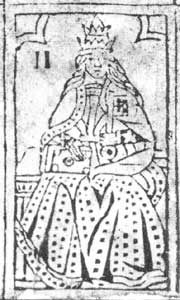About time for my annual viewing of "The Hogfather" by Terry Pratchett. HO. HO. HO.
Silly, irritable people out there in DU Land are squabbling over whether children should be told about Santa Claus, and the nay-sayers sound like joyless 17th century Calvinists.
Meanwhile, I am wearing my badge that says "I saw the Hogfather at Crumley's" and enjoying the season.
How about the rest of you?
Maeve
(42,279 posts)But as the turning of the year approaches, it is on the list!
Kurt V.
(5,624 posts)Hekate
(90,633 posts)The pages at the end that he devotes to the power -- no, the absolute necessity -- of the imagination to being human are among the best in literature.
Hekate
(90,633 posts)Susan comes from an unusual family. Her grandfather is an anthropomorphic personification of Death, who has spent a long time trying to figure out what makes human tick. Susan has chosen to be a schoolteacher.
https://www.goodreads.com/quotes/66591-all-right-said-susan-i-m-not-stupid-you-re-saying-humans
“All right," said Susan. "I'm not stupid. You're saying humans need... fantasies to make life bearable."
REALLY? AS IF IT WAS SOME KIND OF PINK PILL? NO. HUMANS NEED FANTASY TO BE HUMAN. TO BE THE PLACE WHERE THE FALLING ANGEL MEETS THE RISING APE.
"Tooth fairies? Hogfathers? Little—"
YES. AS PRACTICE. YOU HAVE TO START OUT LEARNING TO BELIEVE THE LITTLE LIES.
"So we can believe the big ones?"
YES. JUSTICE. MERCY. DUTY. THAT SORT OF THING.
"They're not the same at all!"
YOU THINK SO? THEN TAKE THE UNIVERSE AND GRIND IT DOWN TO THE FINEST POWDER AND SIEVE IT THROUGH THE FINEST SIEVE AND THEN SHOW ME ONE ATOM OF JUSTICE, ONE MOLECULE OF MERCY. AND YET—Death waved a hand. AND YET YOU ACT AS IF THERE IS SOME IDEAL ORDER IN THE WORLD, AS IF THERE IS SOME...SOME RIGHTNESS IN THE UNIVERSE BY WHICH IT MAY BE JUDGED.
"Yes, but people have got to believe that, or what's the point—"
MY POINT EXACTLY.”
― Terry Pratchett
The Hogfather
real Cannabis calm
(1,124 posts)Lack of bibliography makes it legally dangerous to publish...
Although Ottone Visconti is the first Milanese name on a list of authorities, surrendering to the Barbarossa, after capture of Milan, a member of the next generation, Ariprando, was Bishop of Vercelli between 1208 CE and 1213 CE. He also acted as Papal legate, for Pope Innocent III, who launched the Albigensian Crusade; but the First Crusade, has links to the Visconti family Coat of Arms, which depicts a serpent swallowing a Saracen (Muslim). The Crusades were a series of religious, political wars fought between 1096 CE and 1291 CE. To control the Holy Land, Pope Urban II, initiated the First Crusade (1096–1102 CE) to aid the Christian Byzantine Empire, which was under retaliatory attack by Muslim Turks. In 1099 CE, Crusaders captured Jerusalem. By 1201 CE, Muslims unified against the invaders and won back the Holy Land, which they controlled until the 20th Century.
also
A Popess implies Gnosticism, where women hold equal status with men; but Church historians likely distorted reports on Cathar sexual practices. The Gnostic Revival became a dualistic, Christian movement, which rapidly grew in Europe, until it was branded a heresy, launching the Albigensian Crusade, (also called Cathar Crusade,) from 1209 -1229 CE, against Cathar Christians, ruling families, in Northern France, tolerated. Cathari, from Greek katharos, “pure,” believed in a dualism between good and evil, where the material world – including the Roman Catholic Church – was regarded as evil. After the war began in France, Cathars fled to Northern Italy, where religious persecution was less common.
The last burning of a Gnostic, during the Spanish Inquisition, occurred in 1321 CE, far removed from initial evidence of trionfi over one-hundred years later. Very little evidence of Catharist practices exists, other than accounts by the Roman Catholic Church and Crusaders. Unlike most cities, Catharist communities advocated educating the entire population, including women. For propaganda purposes, Church officials and Crusaders burned most evidence of rational Gnostic practices. Hints of Gnosticism found their way into tarot and subsequent research on card symbolism.
also

I'm throwing in the Visconti trionfi card, which depicts Manfreda Visconti, WHO WAS A ROMAN CATHOLIC NUN, ELECTED AS POPESSA, BY HER SISTERS, AS A RESULT OF PROPHESY!

Rosenwald images of the Pope and Popess bear an uncanny resemblance. Men and women holding equal religious rank suggests Gnosticism, which arose in the first and second centuries based on Platonic dualism. Pope Innocent III openly labeled Gnosticism as heresy, unleashing the Albigensian Crusade, from 1209 until 1255 CE, upon the Gnostic Catharist of Southern France. After capturing a small village of Servian, Crusaders headed for Béziers, arriving on July 21, 1209 CE. Although surrounded, the town refused demands to hand over Catharist. Béziers fell the next day, as Crusaders followed a retreating counter-assault into the city and slaughtered a population of over ten-thousand, in a town protecting around five-hundred Catharist. News of atrocities at Béziers spread rapidly, causing other settlements to surrender to invaders: But assuredly some Gnostics fled to safety. Catharist cities progressively fell, the largest at Peyrepertuse, in 1240 CE. Military effort took a toll on Gnosticism, until the Spanish Inquisition, starting in 1478 CE, ultimately broke the belief. Since then, Christianity has evolved into a constructive social influence, in most cases.
Hekate
(90,633 posts)Do you intend not to publish, or is this just for your own satisfaction?